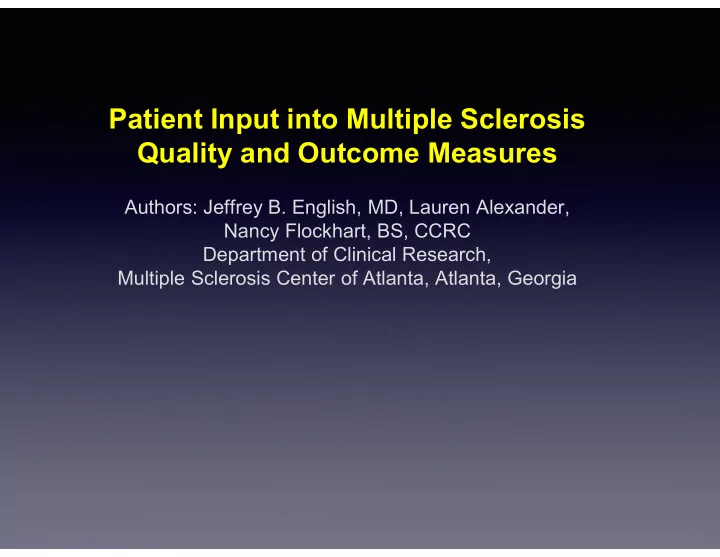

Patient Input into Multiple Sclerosis Quality and Outcome Measures Authors: Jeffrey B. English, MD, Lauren Alexander, Nancy Flockhart, BS, CCRC Department of Clinical Research, Multiple Sclerosis Center of Atlanta, Atlanta, Georgia
Research Objective: To survey patients with multiple sclerosis (MS) at the MS Center of Atlanta on the quality measures they felt most important and to compare the results to those of providers. Learning Objective: Understand the similarities and differences in disease management outcomes most important to MS patients and providers.
Background: • Healthcare practice is shifting towards the focus of outcome measures • Reimbursement and Quality of care based on measures • Definition and goals of quality not yet determined and likely to vary among specialties and disease states • Will evolve • Started with the ACA (Affordable Care Act) • Expanded under MACRA (Medicare Access and CHIP Reauthorization Act) • Will be part of future legislation
Background: • American Academy of Neurology Multiple Sclerosis Quality Measure Set, Neurology, September, 2015 • Task force to develop measure set for MS • Made up of providers and patients advocacy groups • Growing emphasis on patient participating in their diseases • Direct involvement is needed
Background: • MIPS (Merit-based Incentive Payment System) under MACRA • Majority of providers (80%) will work under this plan • MACRA defines how providers practice • 60% of quality score based on patient outcome measures • Of the 11 measures recommended by task force, 3 recognized in MACRA • 2 involve depression, 1 involves falls
Methods: • For simplicity sake, we consolidated the 11 AAN task force measures into 9, leaving off the MS diagnosis measure and consolidating the depression screening and depression outcome measures. • Distributed to providers first- to add any new measures they felt important but missing • 2 surveys then created Original 9 from the AAN 1. The original 9 plus 3 additional measures 2. • Patients and all 11 providers at MS Center of Atlanta then filled out both surveys • Instructions were to rank order measures from most to least important • Blank space on bottom for patient to add measure not included • Surveys were analyzed and compared
Methods: Survey 1 Outcome Measures MRI Change Fatigue 1. 6. Exam Change Memory Change 2. 7. Fall Risk Depression 3. 8. Bladder Infections QOL- Quality of Life 4. 9. Exercise 5.
Methods: Survey 2 Outcome Measures Original 9 plus • Relapses 1. Medication Compliance 2. Medication Access 3.
Results: • 486 patients and 11 providers surveyed • 423/486 patients completed correctly and analyzed • Top 2 measures- MRI change and QOL • Providers- #1 QOL, #2 MRI, #3 Exam Change, #4 Fatigue • Patients- #1MRI, #2 QOL, #3 Fatigue, #4 Exam Change
Results: • Mid Tier Providers and Patients- #5/6 Fall Risk, Memory Loss • Bottom Tier Patients- #7 Bladder Infections, #8 Exercise, #9 Depression • Numbers for bottom tier too low to calculate for providers • Additional 3 measures did not significantly alter top tier except for Medication Access (#4) • Medication Compliance (#9), Relapses (#12) • No significant new measures added by patients • Random individual additions
Results: Outcome Measure Patient Rank (423) Provider Rank (11) MRI Change 1 2 QOL 2 1 Fatigue 3 4 Exam Change 4 3 Memory Loss 5 Falls 6 Bladder Infections 7 Exercise 8 Depression 9 Medication Access 4 9 Medication Compliance Relapses 12 12
Results: • 63 of 486 patients could not accurately complete the surveys • Each person given instructions by 2 staff members • Common errors • Filling out 1 survey but not the other • Ranking each measure on a scale of importance, not rank order • Cognitive impairment appeared to be cause • Memory impairment - rank #5 in survey
Conclusions: • AAN task-force recommendations: • QOL and MRI measures most important to both patients and providers at the MS Center of Atlanta • Followed by exam change and fatigue • Top 3- QOL/MRI/Exam good markers for disease progression • MS Center of Atlanta plan: • Add top 3 measures to our routine monitoring along with chosen official MIPS outcomes • Future, CMS and regulators need to expand approved outcome measures in MS.
Conclusions: • MS community must develop meaningful measures to monitor outcome of disease management. • Measure sets need development and validation • Patients must be involved • What is important to patients not always obvious or same as providers • Need acceptance • Regulatory Agencies • Payor • Measures must be integrated into MS practices on large scale without increasing costs, time, not increase burden on providers • MS care already more time and resource consuming than most diseases
Recommend
More recommend